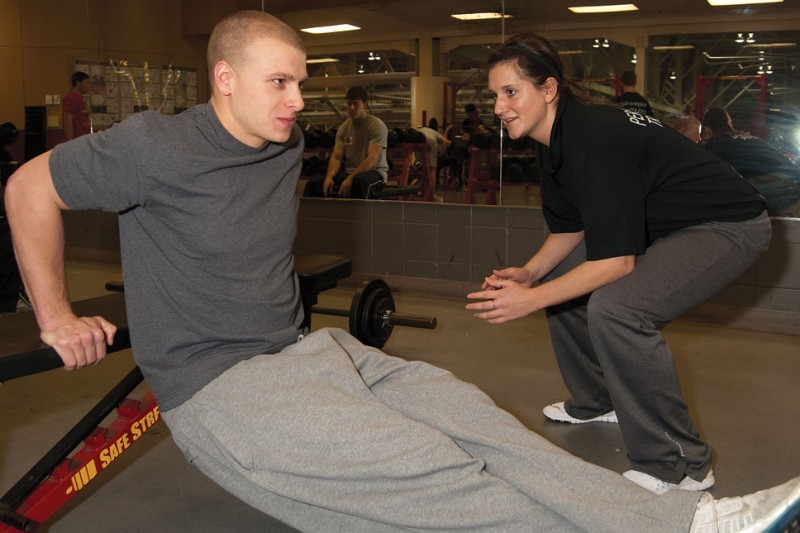What it takes: Students in Iowa State’s personal training program share passion for fitness
Photo: David Derong/Iowa State Daily
Austin Eppert, senior in kinesiology and health, gets help with his squatting excercises while personal trainer Stephanie Spotts, senior in kinesiology and health, helps coach at the Lied Recreational Athletic Center. Spotts has been coaching at Lied since May of last year after receiving national certification last April.
September 12, 2018
Iowa State’s personal training program strives to assist individuals with a lifelong approach to fitness through compassion and understanding.
Started in 2004, the personal training program offers employment for students with a passion for fitness or a related academic major. Aligning with the American Council on Exercise (ACE) certification, students prepare with a rigorous curriculum that is both educational and practical. Hired students must display a proficient level in communication as well as a passion to improve the health of others.
Nora Hudson, assistant director of fitness, said sessions begin by identifying weaknesses in the body and correcting those deficits. Assessing those imbalances can mean increasing stability and mobility, an important phase to make the body feel and move better.
“We want to progress exercise in a pattern of success with coaching and gentle awareness, we want your body to work well to succeed,” Hudson said.
From those with little exercise experience to former high school athletes, a diverse crowd of individuals are part of the personal training program. Student trainers, Georgia Garrett and Austin Keller, both juniors in kinesiology, tailor every plan to accommodate the needs of each trainee.
Garrett was inspired by her sister’s hard work and great successes as a college athlete. She said that communication, knowledge and charisma are a few of the successful traits needed for trainers. This allows trainers to cater to individuals with their unique goals, which is a process that takes time.
The process includes outside research, knowledge of injuries and illnesses clients may have, as well as having an awareness that not every client learns the same way, Garrett said.
“It’s amazing to see a client improve, seeing them reach their goals and getting to know them,” Garrett said. “It’s really rewarding, I’ve had clients tell me a lot of benefits they weren’t expecting and that they enjoyed it.”
Keller agrees that communication and practicality are important traits in successful trainers. Charisma is also crucial in building a relationship with a client, Keller said.
Keller had a transposition of the great arteries due to a heart defect when he was born. However, he is determined to push forward and share his passion with clients.
To Keller, it’s more than exercise, it’s rewarding to teach someone who wants to learn and change their lives to live a healthy lifestyle.
“Fitness is more than going to the gym and getting big or losing fat, fitness can change people’s aspects on life and mindset towards other things,” Keller said.
















